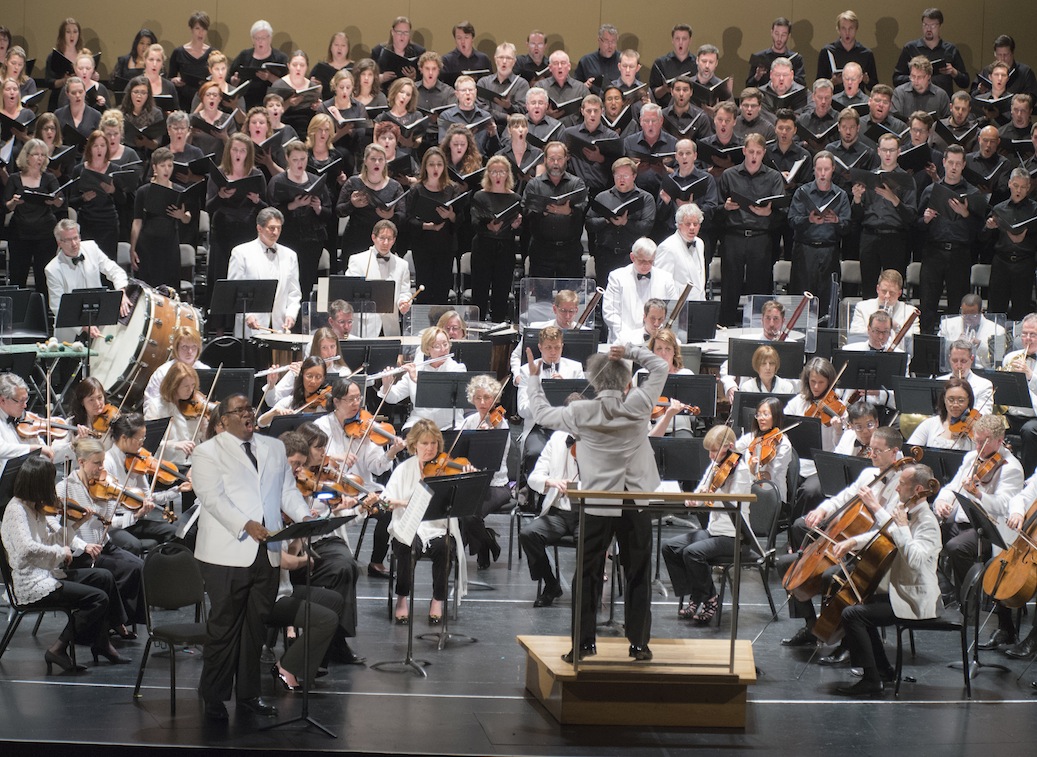Kalmar, Grant Park Orchestra take flight (indoors) with Berlioz rarity

Hector Berlioz eventually settled on calling his Romeo et Juliette a symphonie dramatique, which is about as apt a description as any.
Neither fish nor fowl, opera nor vocal symphony, Romeo et Juliette remains an unwieldy, discursive and rather frustrating work. Berlioz might as well have called it Friar Laurence since the hapless, well-meaning friar gets twice as much music to sing as the doomed lovers. Juliet has only two significant solos (both with chorus) and Romeo’s brief moment is over nearly as quickly as it begins.
Yet there is much glorious music in Romeo et Juliette and this kind of problematic work is prime filet for Carlos Kalmar, a conductor who thrives on making a winning case for rarely heard, challenging pieces.
For this Berlioz performance, the Grant Park Music Festival moved indoors to the Auditorium Theatre Friday night to avoid potential sonic clash with the weekend’s Blues Festival at the Petrillo Band Shell. The tricky logistical change of venue was handled with ease and professionalism by the festival personnel. Indeed, the striking acoustic of the historic Auditorium highlighted the excellence of the unamplified Grant Park Orchestra musicians even more.
Julie Boulianne must have planned her entire summer vacation while sitting on stage for the long stretch of the first half, with nothing to sing after her two brief opportunities. It helped to have a native French singer in this score and the French-Canadian mezzo-soprano floated Juliet’s two arias with radiant tone and poised sensitivity.
Paul Appleby is a gifted artist as shown in his starring turn in Nico Muhly’s compelling Two Boys last fall at the Met. Yet the young tenor sounded rough of tone and vocally out of sorts Friday in Romeo’s brief solo role.
Of the three soloists, Eric Owens had the most music to sing as Friar Laurence and completely dominated the second half of the evening. With his imposing bass-baritone, Owens brought expressive nuance to the friar’s deep remorse and thunderous power to the closing passage with chorus, inveighing against the ancient hatreds of the Montagues and Capulets.
In their first appearance of the summer, the Grant Park Chorus led by Christopher Bell sang with tonal finish and refinement. Placed far back on the deep Auditorium stage, words were not always ideally clear. Oddly, when moved to the balcony behind the audience for an offstage effect, the singing sounded much crisper and more transparent.
Even with its profligate use of three soloists and full chorus, many of the most striking moments in Romeo et Juliette are those for orchestra alone. Kalmar underlined the melodic richness of the score with uncommon delicacy, just as surely as the moments of untrammeled symphonic power when Berlioz unleashes his vast forces. Kalmar and the orchestra brought nimble lightness to the Queen Mab scherzo, jaunty swagger to the party festivities and great melodic warmth to the balcony scene. The final chorus with Owens was resounding in sonic impact.
Do catch the repeat tonight at the Auditorium, as one is unlikely to encounter this Berlioz rarity again anytime soon, not least with the level of commitment and advocacy of Kalmar and the Grant Park Orchestra.
_________________
It’s a shame that such a magnificent and historic venue as Dankmar Adler and Louis Sullivan’s Auditorium—the Chicago Symphony Orchestra’s home before Orchestra Hall was built—is so little utilized these days for classical concerts. Why doesn’t some enterprising local presenter put together a mini-series of adventurous repertory performed by regional orchestras and a couple visiting ensembles at the Auditorium? I would go and I bet others would as well.
Romeo et Juliette will be repeated 7:30 p.m. Saturday at the Auditorium Theatre. gpmf.org
Posted in Uncategorized






Posted Jun 16, 2014 at 9:15 am by BobbyMcc
A good review, Mr. Johnson. Allow me to put forth one correction. One of the odder aspects of Berlioz’s Romeo and Juliet is that Romeo and Juliet do not sing at all! The mezzo’s solo at the beginning is just a narration of the story (she is not Juliet), and the tenor sings lines attributable to Mercutio.